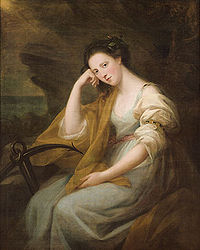
Archibald Macdonald
Encyclopedia

Great Britain
Great Britain or Britain is an island situated to the northwest of Continental Europe. It is the ninth largest island in the world, and the largest European island, as well as the largest of the British Isles...
lawyer and politician.
Family
Archibald Macdonald was the posthumous son of Sir Alexander Macdonald, 7th Baronet, and younger brother of the 8th baronet (see Baron MacdonaldBaron Macdonald
Baron Macdonald, of Slate in the County of Antrim, is a title in the Peerage of Ireland. It was created in 1776 for Sir Alexander Macdonald, 9th Baronet, of Sleat. The Macdonald family descends from Uisdean Macdonald , also known as Hugh Macdonald, illegitimate son of Alexander Macdonald, Earl of...
), but was bought to England in the aftermath of Culloden
Battle of Culloden
The Battle of Culloden was the final confrontation of the 1745 Jacobite Rising. Taking place on 16 April 1746, the battle pitted the Jacobite forces of Charles Edward Stuart against an army commanded by William Augustus, Duke of Cumberland, loyal to the British government...
to complete his education at Westminster School
Westminster School
The Royal College of St. Peter in Westminster, almost always known as Westminster School, is one of Britain's leading independent schools, with the highest Oxford and Cambridge acceptance rate of any secondary school or college in Britain...
and Christ Church, Oxford
Christ Church, Oxford
Christ Church or house of Christ, and thus sometimes known as The House), is one of the largest constituent colleges of the University of Oxford in England...
. He was called to the bar at Lincolns Inn in 1770. In 1777, he married Lady Louisa Leveson-Gower daughter of the Earl Gower
Granville Leveson-Gower, 1st Marquess of Stafford
Granville Leveson-Gower, 1st Marquess of Stafford PC , known as Viscount Trentham from 1746 to 1754 and as The Earl Gower from 1754 to 1786, was a British politician.-Background:...
, then Lord President of the Council
Lord President of the Council
The Lord President of the Council is the fourth of the Great Officers of State of the United Kingdom, ranking beneath the Lord High Treasurer and above the Lord Privy Seal. The Lord President usually attends each meeting of the Privy Council, presenting business for the monarch's approval...
.
Politics
He was Member of ParliamentMember of Parliament
A Member of Parliament is a representative of the voters to a :parliament. In many countries with bicameral parliaments, the term applies specifically to members of the lower house, as upper houses often have a different title, such as senate, and thus also have different titles for its members,...
for Hindon
Hindon (UK Parliament constituency)
Hindon was a parliamentary borough consisting of the village of Hindon in Wiltshire, which elected two Members of Parliament to the House of Commons from 1448 until 1832, when the borough was abolished by the Great Reform Act...
in Wiltshire
Wiltshire
Wiltshire is a ceremonial county in South West England. It is landlocked and borders the counties of Dorset, Somerset, Hampshire, Gloucestershire, Oxfordshire and Berkshire. It contains the unitary authority of Swindon and covers...
(1777-1780) and then for Newcastle-under-Lyme
Newcastle-under-Lyme (UK Parliament constituency)
Newcastle-under-Lyme is a borough constituency represented in the House of Commons of the Parliament of the United Kingdom. It elects one Member of Parliament by the first past the post system of election.- History :...
(1780-1792), a seat where his father-in-law had a strong influence. In politics, he followed the political lead of his father-in-law.
Judge
He was appointed as second judge of the Carmarthen circuit in Wales in 1780. He was promoted to Lord Chief Baron of the ExchequerLord Chief Baron of the Exchequer
The Chief Baron of the Exchequer was the first "baron" of the English Exchequer of pleas. "In the absence of both the Treasurer of the Exchequer or First Lord of the Treasury, and the Chancellor of the Exchequer, it was he who presided in the equity court and answered the bar i.e...
from 1790, the least important of the Westminster law courts. He served in this post until he retired in 1813, due to failing eyesight.

